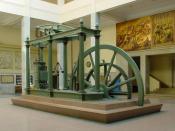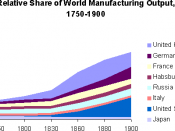In the following essay the causes of poverty in Britain between 1750 and 1834 shall be discussed.
Britain in the late eighteenth century was going through many changes, which caused poverty to increase in Britain. Whether that was the Industrial Revolution, Agricultural Revolution, mobility of labour, population growth or even the Poor Law; they all played a part in British poverty.
Between 1750 and 1834 there was a large increase in the population, combined with migration from the countryside to the towns in search of work. Also according to the BBC British History "through the 1700s the population virtually doubled every 50 years" (BBC, 2006). With the population increasing, more and more people fell into poverty. Population boost, not only meant a rise in birth rates but also fall in death rates; hence life expectancy increased. With birth rates on the raising side, working class people found it hard to provide for their families.
In order to survive, many people migrated to towns in search for jobs. "The average number of moves during a person's life increased from the eighteenth to the nineteenth century" (Pooley,1998), which not only brought instability but because the 'Old Poor Law' stated that the Parish was the administrative unit responsible for poor relief, meant if working class people needed poor relief they had to go back to their original place of birth. Another problem which emerged with the increase of population was food production did not increase the way the population did.
Furthermore, In 1798 Thomas Malthus published 'Principles of Population'. He believed that natural rates of human reproduction, when unchecked, would lead to "geometric increases in population and that population would grow in a ratio of 1, 2, 4, 8, 16, 32, 64, 128, 256, 5122" and so forth. However he...


